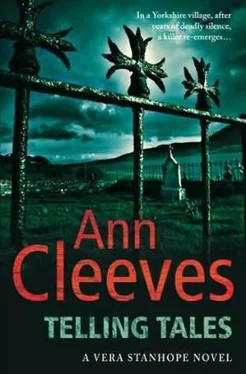Ann Cleeves - Telling Tales
Здесь есть возможность читать онлайн «Ann Cleeves - Telling Tales» весь текст электронной книги совершенно бесплатно (целиком полную версию без сокращений). В некоторых случаях можно слушать аудио, скачать через торрент в формате fb2 и присутствует краткое содержание. Жанр: Детектив, на английском языке. Описание произведения, (предисловие) а так же отзывы посетителей доступны на портале библиотеки ЛибКат.
- Название:Telling Tales
- Автор:
- Жанр:
- Год:неизвестен
- ISBN:нет данных
- Рейтинг книги:5 / 5. Голосов: 1
-
Избранное:Добавить в избранное
- Отзывы:
-
Ваша оценка:
- 100
- 1
- 2
- 3
- 4
- 5
Telling Tales: краткое содержание, описание и аннотация
Предлагаем к чтению аннотацию, описание, краткое содержание или предисловие (зависит от того, что написал сам автор книги «Telling Tales»). Если вы не нашли необходимую информацию о книге — напишите в комментариях, мы постараемся отыскать её.
Telling Tales — читать онлайн бесплатно полную книгу (весь текст) целиком
Ниже представлен текст книги, разбитый по страницам. Система сохранения места последней прочитанной страницы, позволяет с удобством читать онлайн бесплатно книгу «Telling Tales», без необходимости каждый раз заново искать на чём Вы остановились. Поставьте закладку, и сможете в любой момент перейти на страницу, на которой закончили чтение.
Интервал:
Закладка:
Now the memory made him think he might be running short of underpants. He gathered up the dirty washing from the basket in the bathroom and stuck it in the washing machine. A week ago the laundry would have been a full day’s occupation. He’d plan it in advance, sit in the kitchen watching his Y-fronts tumble around in the suddy water, feeling he was doing something useful. Today it was a chore to get out of the way. He had things to do.
He was hungry. Had he eaten the day before when he’d arrived back from the Anchor? He couldn’t remember. His head had been full of plans, his excitement fuelled by the whisky he’d finished off. Now he raided the fridge like a kid ravenous after a day at school, and fried up eggs, bacon, a few leftover cooked potatoes. He left the plate in the sink, already fidgety to be out, with no real idea of where he’d go. As he left the bungalow the church clock struck the three quarter hour. Seven forty-five. Still too early for all the things he’d planned the night before, but he couldn’t face going back inside.
The rain had stopped. He took the lane which led towards the estuary. The path was lit by widely spaced street lamps and the wet road underneath looked black and shiny like melted tar. On one side there was a row of brick cottages. Lights were on now and an occasional sound a door slamming, a burst of the radio -escaped to be tossed away by the wind. On the other side were fields with rough grazing and a few sheep. He couldn’t see the sheep but he knew they were there. He could hear them moving. The fields were separated from the lane by a stone wall and he walked briskly against the wind until he came to a break in it. There were no more houses now. He’d reached the edge of the village.
The gap in the wall was blocked by a gate and he thought for a moment that it might be locked and that he’d be forced to scramble over it. He’d been here before but only in daylight. Late afternoon, usually,
when the sun slanted through the big sycamores. Not recently though. Recently he’d neglected even to get here. Sycamores always held their leaves well into the autumn and some of the trees were still in leaf even now. The wind made a sound in them, so he was fooled briefly into thinking he could hear the tide ebbing in the estuary.
The gate was on a latch and opened easily. He was inside. Surrounded on four sides by the trees. He didn’t stop to read the notice on the gate. He knew it read Elvet parish cemetery. Established 1853. In the east the sky was starting to lighten and he could make out the pale slabs of the headstones. He could have found Peg’s even if it had still been pitch dark. She had wanted to be buried. It had been one of the instructions she’d given him, forced it out through dry lips in the same way as she’d told him how to use the washing machine.
He’d come to make his peace with Peg. He’d been putting together the words as he walked along the lane. I went to pieces after you died. You know what I’m like. No good without you. Thingsil be different now.
But instead of talking to her he found himself remembering the first time he’d realized she was ill. It had been a couple of weeks after the Mantel girl had died. The murder had upset her. Really upset her, as if she’d been Abigail’s mother. She’d said that was what it felt like, like she’d lost a daughter. It had been a dreadful time. Jeanie mooning around the house, trying to phone Mantel though he’d made it clear he didn’t want to speak to her. Peg grieving for a girl she’d hardly known. That morning the two of them had been in the kitchen. Peg had been baking for some do at the church. The autumn fay re She’d rolled out the dough for scones and had started cutting them out with an upturned wine glass. Suddenly she’d seemed to crumple and the glass had rolled out of her hand. She’d stood there, bent double with the pain. He’d just come in from a shift and was drinking tea at the table. He’d caught the glass just before it rolled onto the floor, but when he’d got up to help her she’d waved him away as if she knew what to do, and he knew that this hadn’t been the first time it had happened. Then the doorbell had rung and Peg had said, “Go and get it, will you?” All impatient. He’d understood that the pain had made her fractious, but also that she’d needed time to pull herself together.
Two police officers had been standing on the doorstep. Not in uniform, but he’d recognized them. One was the woman, the inspector, the other her sergeant, the big bloke. Greenwood. Michael could picture them now, standing there. It had been snowing and the big soft flakes were sticking to their coats, melting slowly, keeping the shape of the crystal. The woman had smiled. It hadn’t been a false smile. It had been as if she’d been really pleased to see Michael, and he’d loved that feeling. He’d always been a fool around women. Always taken in by their flattery.
“Mind if we come in for a few minutes?” she’d said. She’d stamped her boots on the step to shake off the snow. The boots had narrow heels, almost pointed, and although she’d been otherwise soberly dressed, he’d thought there’d been something frivolous about them, tarty even. The man, Dan Greenwood, had seemed uncomfortable, edgy. Later, when he moved to the village, he’d been followed by rumours. Michael had heard he’d had a breakdown. Perhaps he’d been on the verge of illness even then. Michael had felt it had taken an effort of will for him to follow his boss into the house.
“Is Jeanie around?” Fletcher had asked, not as if she were desperate to speak to the girl. More as if she’d been passing anyway so she might as well have a word. Through the open kitchen door Peg had caught Michael’s eye. He’d thought she was trying to tell him something, but he hadn’t worked out what it could be. He hadn’t sensed the danger.
“She’s upstairs,” he’d said and had yelled up at Jeanie to come down. Peg had turned away in despair. She’d always been smarter than him. She must have known, even then, what the police were there for.
Jeanie hadn’t come out of her room immediately, and they’d stood in the hall looking up to the landing, necks cricked in anticipation. There had been no response to Michael’s shout of command, no sound or movement and he had felt the tension stretch, saw it like a piece of elastic about to snap. Had he realized even then what the police were really there for? Or had he still been too dumb?
There had been the soft click of the door being opened and Jeanie had appeared at the top of the stairs. She’d been wearing blue jeans and a green sweater with a big cowl neck. No shoes but thick woollen socks which made no sound when she walked. It had been the socks they’d seen first through the banisters as she’d approached them down the stairs. She’d lost weight since Abigail’s murder. Michael had noticed that looking up at her from the unusual angle. He’d thought uncharitably that she’d not stopped eating through grief for the girl. It had been a pathetic love sickness. She’d wasted away because Mantel had refused to have anything more to do with her.
At that point Peg had come out of the kitchen, her body held rigid as if she’d been scared the pain would return, but fighting all the same.
“What do you want with her now?” Spitting out the words towards the inspector.
Fletcher had turned towards Peg. Her hair had swung like the hair in shampoo advertisements, polished, falling obediently back into place. She’d looked at Peg for a moment, considering if an answer was necessary.
“We’d like to ask Jeanie a few more questions. At the police station. We need her to help us with our enquiries.”
“You’ll not talk to her without a solicitor!”
“Yes,” the inspector had said, giving a quick nod of approval, as if Peg had been the only other person present bright enough to realize the gravity of the situation. “I think you should arrange for her lawyer to be there as soon as possible.” She’d paused and then added, “And you might like to pack a small bag for Jeanie. Essentials. It’s very likely that we’ll be charging her.” Her voice had been measured, melodious, but looking back Michael understood that this had been her moment of triumph.
Читать дальшеИнтервал:
Закладка:
Похожие книги на «Telling Tales»
Представляем Вашему вниманию похожие книги на «Telling Tales» списком для выбора. Мы отобрали схожую по названию и смыслу литературу в надежде предоставить читателям больше вариантов отыскать новые, интересные, ещё непрочитанные произведения.
Обсуждение, отзывы о книге «Telling Tales» и просто собственные мнения читателей. Оставьте ваши комментарии, напишите, что Вы думаете о произведении, его смысле или главных героях. Укажите что конкретно понравилось, а что нет, и почему Вы так считаете.












